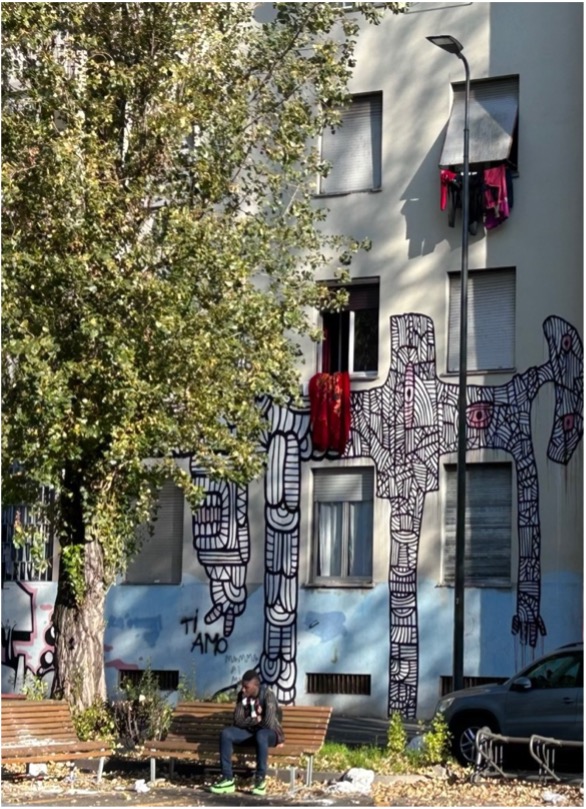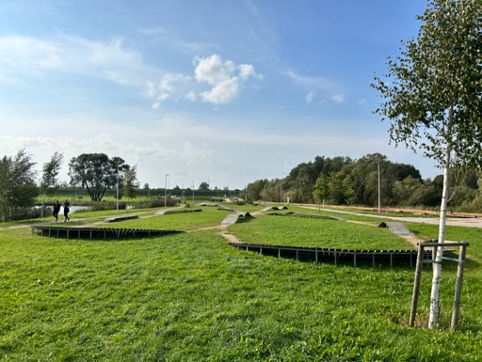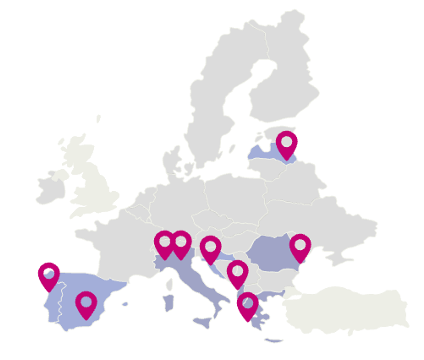 The multifaceted challenge of youth discomfort and abandoned public spaces.
The multifaceted challenge of youth discomfort and abandoned public spaces.
In today's ever-evolving urban landscapes, adolescents, particularly -but not only- those living in the outskirts of cities or in degraded social districts, are confronted with a multitude of personal challenges, spanning from educational poverty and mental health diseases to a lack of secure and quality public spaces for socializing and engaging in recreational activities. This inadequacy in educational opportunities and limited access to leisure facilities can exacerbate the feelings of disengagement and discontent among the youth. Amidst urban challenges lie also the presence of neglected and desolate public spaces, which significantly mar the physical landscape and directly impact the well-being and quality of life of the resident communities, particularly young people. However, there exists a transformative perspective that views these neglected areas not merely as derelict spaces in need of revitalization, but as experimental canvases for innovative urban regeneration. Central to this transformative approach is the active involvement and collaboration of diverse stakeholders, ranging from youth organizations and cultural associations to sports groups, schools, and most importantly, the active participation of the youth themselves. This collective engagement goes beyond consultation; it encompasses active participation in the co-designing, co-creating, and co-managing of public spaces, fostering a sense of shared ownership, leading to a collective responsibility in managing public spaces as common goods belonging to the urban communities.
The Re-Gen anticipated solutions
 In this prospect, the nine cities of the Re-Gen Network are going to plan and test Sport-Based Solutions for an innovative approach to urban regeneration. The abandoned public spaces are figured out as Urban Sport Hubs, multifunctional inclusive places for street sport, cultural and recreational activities directedly promoted and managed by youngsters. Such anticipated solution to the multifaceted challenge of youths’ discomfort, presence of degraded areas in the contemporary cities, as well as of the lack of places for young people, represents a paradigm shift in the sphere of urban regeneration, where final users are called to be protagonist of urban scenes transformation. Beyond conventional sports arenas, the urban sport hubs are conceived as dynamic community places, promoting not only street sports but also cultural events, interactive forums, and active civic engagement. Hubs are abandoned spaces given back as vibrant renovated places to the communities of young people that had contributed to their regeneration and that will take care of them in the future. the Urban Sport Hubs are characterized by being multifunctional places that are catalysts for healthy lifestyles and opportunities for creative and active street education; they are catalysts for young people and for the entire neighborhood community, they are designed and managed to be accessible to all without gender or disability discrimination. They are envisioned as inclusive beautiful places where young individuals find an outlet for healthy recreation while fostering community connections. Beyond their function as sporting venues, these hubs aspire to become an attractive place where the community converges, interacts, and thrives. The transformative potential of the Urban Sport Hubs transcends physical spaces; they symbolize a revitalized community spirit. Through the engagement of youth and diverse stakeholders, these hubs instill a sense of collective responsibility and communal ownership. They embody a vision for urban communities characterized by active involvement, pride, and a promising future. These transformative Re-Gen perspectives offer a beacon of hope, redefining the narrative of neglected urban spaces from blighted areas to platforms for regeneration and rejuvenation. By harnessing the collective energy, innovative ideas, and enthusiasm of the youth and various stakeholders, these initiatives pave the way for a reimagined urban landscape—a landscape that thrives on inclusivity, creativity, and community cohesion.
In this prospect, the nine cities of the Re-Gen Network are going to plan and test Sport-Based Solutions for an innovative approach to urban regeneration. The abandoned public spaces are figured out as Urban Sport Hubs, multifunctional inclusive places for street sport, cultural and recreational activities directedly promoted and managed by youngsters. Such anticipated solution to the multifaceted challenge of youths’ discomfort, presence of degraded areas in the contemporary cities, as well as of the lack of places for young people, represents a paradigm shift in the sphere of urban regeneration, where final users are called to be protagonist of urban scenes transformation. Beyond conventional sports arenas, the urban sport hubs are conceived as dynamic community places, promoting not only street sports but also cultural events, interactive forums, and active civic engagement. Hubs are abandoned spaces given back as vibrant renovated places to the communities of young people that had contributed to their regeneration and that will take care of them in the future. the Urban Sport Hubs are characterized by being multifunctional places that are catalysts for healthy lifestyles and opportunities for creative and active street education; they are catalysts for young people and for the entire neighborhood community, they are designed and managed to be accessible to all without gender or disability discrimination. They are envisioned as inclusive beautiful places where young individuals find an outlet for healthy recreation while fostering community connections. Beyond their function as sporting venues, these hubs aspire to become an attractive place where the community converges, interacts, and thrives. The transformative potential of the Urban Sport Hubs transcends physical spaces; they symbolize a revitalized community spirit. Through the engagement of youth and diverse stakeholders, these hubs instill a sense of collective responsibility and communal ownership. They embody a vision for urban communities characterized by active involvement, pride, and a promising future. These transformative Re-Gen perspectives offer a beacon of hope, redefining the narrative of neglected urban spaces from blighted areas to platforms for regeneration and rejuvenation. By harnessing the collective energy, innovative ideas, and enthusiasm of the youth and various stakeholders, these initiatives pave the way for a reimagined urban landscape—a landscape that thrives on inclusivity, creativity, and community cohesion.
The Re-Gen network
The transformative potential of sports-based solutions will be explored in nine cities within the Re-Gen Urbact Network: Verona (IT) leading the network, Albacete (ES), Corfu (GR), Daugavpils (LT), Dobrich (BG), Milan (IT), Pula (HR), Vila Do Conte (P), and Lezha (AL). Each city will define specific priorities based on its unique starting point while consistently integrating the issues faced by young individuals aged 10 to 18. By emphasizing the rejuvenation of public spaces through sports and the creation of multifunctional areas, these cities are dedicated to fostering vibrant, inclusive communities. Follow the Re-Gen Network to disconver how these cities are spearheading change, leveraging the potential of youth and innovative urban approaches to shape a brighter future for everyone.
Looking ahead
Looking ahead, the Re-Gen Urban Sport Hubs echo the principles of the New European Bauhaus, placing emphasis on sustainability and inclusivity while prioritizing aesthetics and ethics. Collaborating with local stakeholders and young individuals, Re-Gen cities will work together to strategize and reimagine abandoned spaces by integrating eco-friendly and gender-sensitive design elements. This comprehensive approach not only encourages physical activity but also fosters cultural events and communal gatherings. Through co- design initiatives, these efforts instill a sense of ownership and responsibility among youth, providing avenues for self-expression and community involvement.
The Urban Sport Hubs epitomize an innovative vision for urban regeneration, transcending mere physical spaces to become lively arenas for social interaction and community empowerment. By transforming neglected spaces into hubs for inclusive sports and cultural engagement, they represent a beacon of hope for marginalized urban communities. These hubs exemplify the potential of collective action, youth engagement, and innovative urban planning in revitalizing overlooked areas into thriving centers of community life. As cities progress, the legacy of Urban Sport Hubs stands as a testament to the transformative influence of inclusivity, creativity, and community engagement in urban regeneration endeavors.

